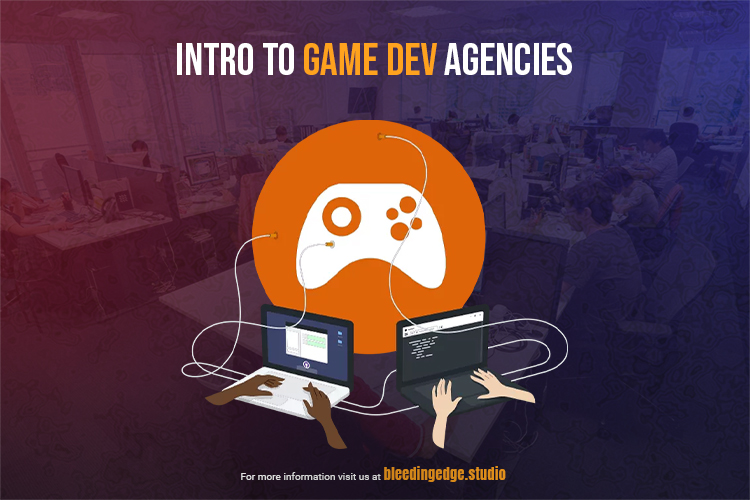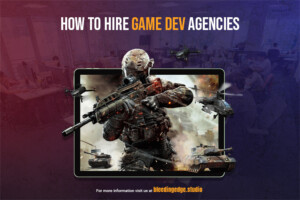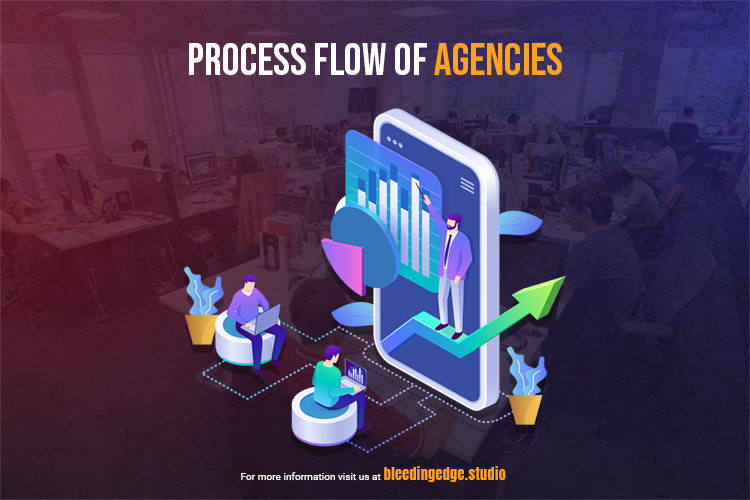Introduction
Staying ahead of the expected is essential for success in the fast-paced and ever-evolving gaming world of Game Development Agency. Whether you’re a seasoned game developer or a startup looking to make your mark, choosing the right game development agency can be a critical decision that shapes the future of your project. In this article post, we try to explore the key considerations and tips to ensure you make an informed decision when hiring a game development agency.

1.Define Your Project Goals and Requirements
Before hiring a game development agency, it’s crucial to understand your project goals and requirements clearly. Take the time to define the scope of your project, identify the target audience, and outline the specific features and functionalities you want in your game.
Ask yourself questions like:
What is the genre of the game?
Are you developing for a specific platform (mobile, PC, console, VR)?
What is the expected timeline for the project?
Do you require additional marketing, testing, or ongoing maintenance services?
By establishing a solid foundation for your project, you can effectively communicate your vision to potential game development agencies and ensure they have the expertise to meet your unique requirements.
1.Research and Shortlist Potential Agencies
The next step in the hiring process is to research and create a shortlist of potential game development agencies. Start by exploring online platforms, industry forums, and social media to identify agencies that have a proven track record in developing games similar to yours. Look for agencies with positive reviews, testimonials, and case studies showcasing their expertise.
Consider the following factors when shortlisting agencies:
Portfolio: Review the agency’s portfolio to assess the quality and diversity of their previous projects.
Expertise: Ensure the agency has experience in your target genre and platform.
Technology Stack: Verify the technologies and tools the agency specializes in, ensuring compatibility with your project requirements.
Team Composition: Evaluate the skill set and expertise of the agency’s development team.
Creating a shortlist based on these criteria will sort your options and make the selection process more manageable.
1.Evaluate Experience and Expertise
The experience and expertise of a game development agency play a pivotal role in the success of your project. Look for agencies with a proper track record in developing similar games, as this indicates a deeper understanding of the challenges and requirements specific to your genre or platform.
Consider the following when evaluating experience and expertise:
Years in the Industry: A longer track record often suggests stability and adaptability in the ever-changing gaming landscape.
Successful Projects: Focus on agencies with a history of delivering successful and well-received projects.
Industry Recognition: Awards, nominations, and industry partnerships can indicate an agency’s standing in the gaming community.
Also, please inquire about the agency’s innovation approach and willingness to adopt new technologies. A forward-thinking agency can bring fresh ideas and perspectives to your project, contributing to its success of Game Development Agencygame development agencies
.
1.Assess Development Processes and Methodologies
Effective project management and development processes are crucial for a game’s timely and successful delivery. When evaluating potential game development agencies, inquire about their development processes and methodologies. A well-defined and transparent process ensures all stakeholders are on the same page, minimizing misunderstandings and streamlining communication.
Consider the following aspects of development processes:
Project Management: Understand how the agency manages projects, including communication channels, progress tracking, and issue resolution.
Agile Methodology: Many successful game development projects adopt agile methodologies, allowing for flexibility and iterative development.
Prototyping: Inquire about the agency’s approach to prototyping and how they involve clients in the feedback and iteration process.
Choosing an agency with a robust development process will contribute to a smoother collaboration and increase the likelihood of delivering a high-quality game on time and within budget.

1.Evaluate Technical Proficiency
Technical proficiency is a cornerstone of successful Game Development Agency. Assess the technical capabilities of potential agencies by examining their expertise in relevant programming languages, game engines, and development tools. An agency’s technical stack should align with your project’s requirements.
Consider the following technical aspects:
Programming Languages: Ensure the agency has expertise in programming languages suitable for your chosen platform (e.g., C++, C#, JavaScript).
Game Engines: Evaluate the agency’s experience with popular game engines like Unity, Unreal Engine, or others relevant to your project.
Platforms: Confirm that the agency has experience developing games for the media you are targeting (e.g., iOS, Android, PC, console, VR).
A technically proficient agency can navigate challenges more effectively, optimize performance, and deliver a game that meets industry standards.
1.Review Communication with Partners
Effective communication with teamwork are essential for a successful partnership between you and the game development agency. Transparent and regular communication ensures everyone is aligned on project goals, timelines, and expectations.
Consider the following communication factors:
Project Management Tools: Inquire about the agency’s tools and platforms for project management and communication.
Communication Channels: Establish clear communication channels, schedules, and reporting mechanisms to keep all parties informed.
Collaboration Culture: Assess the agency’s approach to collaboration and willingness to involve clients in decision-making processes.
Clear and open communication fosters a collaborative environment, allowing for the efficient resolution of issues and implementing feedback throughout the development lifecycle.
1.Request References and Case Studies
To gain deeper insights into the capabilities and reliability of a game development agency, request references and case studies from their previous clients. Contacting references lets you hear firsthand about the agency’s strengths, challenges, and overall satisfaction with the collaboration.
Consider the following when reviewing references and case studies:
Project Similarity: Look for references with projects similar to yours in scope, genre, or platform.
Collaboration Dynamics: Inquire about the collaboration dynamics, communication effectiveness, and the agency’s ability to meet deadlines and milestones.
Challenges and Solutions: Understand the challenges faced during the project and how the agency addressed them.
References and case studies provide valuable insights that can help you make an strong decision based on real-world experiences with the agency.
1.Evaluate Flexibility and Scalability
The gaming industry is dynamic and subject to rapid changes, requiring adaptability and Scalability from game development agencies. Assess the agency’s flexibility to accommodate changes in project scope, requirements, or emerging technologies. Additionally, consider their Scalability in case you need to expand the development team or integrate additional services.
Consider the following factors related to flexibility and Scalability:
Adapting to Change: Inquire about the agency’s experience handling changes in project scope or requirements and how they manage such situations.
Scalability: Assess the agency’s ability to scale the development team if needed and their access to additional resources.
Future-Proofing: Discuss the agency’s approach to adopting new technologies and trends, ensuring that your game remains relevant in the long term.
Choosing a flexible and scalable agency ensures that your project can evolve with the dynamic nature of the gaming industry.
1.Discuss Budget and Pricing Models
A clear understanding of the budget and pricing models is crucial for successfully collaborating with a game development agency. Transparent discussions about costs, payment schedules, and potential additional expenses help prevent misunderstandings and ensure that both parties are aligned on financial expectations.
Consider the following aspects when discussing budget and pricing:
Total Project Cost: Clearly define the total project cost, including development, testing, and any additional services.
Payment Schedule: Agree on a schedule that aligns with project milestones and deliverables.
Additional Costs: Discuss potential additional costs, such as changes in scope, extended timelines, or unforeseen challenges.
By transparent discussion about budget and pricing, you can avoid financial surprises and establish a healthy working relationship with the agency.
1.Legal Considerations: Contracts and Intellectual Property
The legal aspects of the collaboration are essential for protecting both parties involved. Before finalizing an agreement with a game development agency, carefully review and negotiate the terms outlined in the contract. Ensure the contract covers critical areas such as project scope, timelines, payment terms, confidentiality, and intellectual property rights.
Consider the following legal considerations:
Contract Review: Seek legal advice to review the contract thoroughly and address any concerns or ambiguities.
Intellectual Property Rights: define the ownership of intellectual property rights for the game and its components.
Confidentiality: Ensure that the contract includes provisions for confidentiality to protect sensitive information.
A well-drafted and comprehensive contract provides a solid foundation for a successful and legally sound collaboration with the game development agency.
Process Flow of Game Development Agencies:

1.Project Initiation:
Requirement Analysis: Understand the client’s vision, goals, and specific requirements for the game.
Feasibility Study: Assess the technical and financial feasibility of the project.
1.Proposal and Contracting:
Proposal Submission: Game development agencies submit a detailed proposal outlining the project scope, timelines, and costs.
Contract Negotiation: Finalize terms, including payment schedules, milestones, and legal considerations.
1.Conceptualization and Design:
Conceptual Design: Develop the game concept, including storyline, characters, and overall design.
Prototyping: Create a prototype or mockup to visualize critical features and functionalities.
1.Development:
Coding: Implement the game’s logic, mechanics, and features using the chosen programming languages and engines.
Art and Animation: Design and integrate graphics, animations, and visual elements.
Sound and Music: Incorporate sound effects and music to enhance the gaming experience.
1.Testing:
Quality Assurance: Conduct rigorous testing to identify and fix bugs, ensure functionality, and optimize performance.
User Testing: Gather feedback from target users to improve user experience.
1.Deployment:
Platform Compatibility: Adapt the game for various platforms (mobile, PC, console) and ensure compatibility.
Launch Strategy: Develop a strategy, including marketing, promotion, and distribution plans.
1.Post-Launch Support:
Bug Fixes and Updates: Address post-launch issues, release patches, and provide ongoing support.
Community Engagement: Foster a community around the game through updates, events, and user interactions.
1.Analytics and Feedback:
Data Analysis: Use analytics tools to gather user behavior, preferences, and performance data.
Feedback Integration: Incorporate user feedback into future updates and game improvements.
1.Advantages of Game Development Agencies:
2.a. Expertise and Experience:
Game development agencies bring specialized skills and extensive experience, having worked on various projects.
1.b. Dedicated Teams:
Agencies often have dedicated teams of developers, designers, artists, and testers, ensuring a comprehensive skill set for each project.
1.c. Access to Technology:
Agencies stay updated with the latest technologies and tools, ensuring your game benefits from cutting-edge advancements.
1.d. Cost Efficiency:
Outsourcing game development to agencies can be cost-effective, as it eliminates the need for in-house teams and infrastructure.
1.e. Time Savings:
Agencies are equipped to handle projects efficiently, often resulting in faster development cycles than in-house teams.
1.f. Quality Assurance:
Game development agencies prioritize quality assurance, conducting thorough testing to deliver a polished, bug-free product.
1.g. Scalability:
Agencies can scale their teams based on project requirements, providing flexibility to handle small and large-scale projects.
1.h. Risk Mitigation:
With a proven track record, game development agencies can mitigate risks associated with development, ensuring smoother project execution.
1.i. Collaborative Approach:
Agencies often adopt a collaborative approach, involving clients in decision-making and fostering open communication.
1.j. Post-Launch Support:
Game development agencies typically offer post-launch support, addressing issues promptly and providing ongoing updates to enhance the gaming experience.
1.In conclusion, leveraging the services of a game development agency streamlines the development process, enhances the quality of the final product, and allows clients to focus on their core potentials while leaving the technical aspects of game development in expert hands.
Here are a few more points highlighting the advantages and critical considerations in the process flow of game development agencies:
Additional Advantages of Game Development Agencies:
k. Global Talent Pool:
– Game Development Agency often have access to a diverse and global talent pool, allowing them to assemble teams with a huge set of skills and expertise.
l. Industry Insights:
– Game Development Agency stay abreast of industry trends, ensuring their games align with current player expectations and market demands.
m. Creative Collaboration:
– Game Development Agency encourage creative collaboration, bringing artists, designers, and developers together to generate innovative ideas and solutions.
n. Risk Management:
– Experienced Game Development Agency are adept at identifying and mitigating risks early in the development process, reducing the likelihood of project setbacks in Game Development Agency.
o. Comprehensive Services:
– Beyond development, agencies often offer complementary services, including marketing, analytics, and post-launch support of Game Development Agency.
Critical Considerations in the Process Flow:
p. Client Involvement:
– Establish a clear understanding of the level of client involvement throughout the development process, ensuring effective collaboration and satisfaction.
q. Communication Protocols:
– Define communication protocols and channels to ensure that information flows smoothly between the client and the development team, fostering transparency of Game Development Agency.
r. Agile Development:
– Consider adopting agile development methodologies, allowing for iterative development, quick adaptation to changes, and regular client feedback for Game Development Agency.
s. Security Measures:
– Implement robust security measures to safeguard the game’s code, assets, and sensitive information throughout the development and post-launch phases.
t. Market Research:
– Conduct thorough market research to understand player demographics, preferences, and trends, informing the development process and marketing strategies.
u. Legal Compliance:
– Ensure that the game development agency adheres to legal and regulatory requirements, particularly concerning intellectual property rights, licensing, and data protection.
v. User Experience (UX) Focus:
– Prioritize user experience by incorporating user-centric design principles, intuitive interfaces, and engaging gameplay to enhance player satisfaction.
w. Scalable Infrastructure:
– Ensure that the infrastructure supporting the game is scalable to accommodate potential increases in user traffic and demand post-launch.
x. Feedback Loops:
– Establish feedback loops within the development process, allowing continuous improvement based on user feedback, analytics, and market changes.
y. Documentation:
– Maintain comprehensive Documentation throughout the development process, including design documents, coding standards, and project plans for future reference and Scalability.
z. Post-Launch Marketing:
– Develop a robust post-launch marketing strategy to promote the game, attract new players, and sustain engagement over time.
By considering these additional points, you can further enhance the success of your collaboration with a game development agency, ensuring that your project not only meets but exceeds expectations of Game Development Agency.
Conclusion
Hiring the right game development agency is critical in bringing your gaming project to life. By considering the factors discussed in this elaborative guide, you can make a decision that aligns with your project goals and ensures a successful partnership. From defining your project requirements to evaluating the technical proficiency of potential agencies, each step contributes to a thorough and effective hiring process.
Remember that the gaming industry is dynamic, and a successful collaboration requires ongoing communication, adaptability, and a shared commitment to excellence. By following these tips and conducting a diligent evaluation of potential agencies, you can confidently navigate the game development landscape and set the stage for the success of your gaming project in Game Development Agency.
For more topics, see https://bleedingedge.studio/blog/

